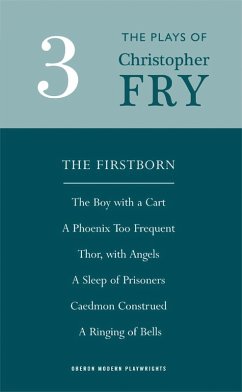Includes the playsThe Firstborn, A Phoenix Too Frequent, A Sleep of Prisoners, Thor, With Angels, The Boy With a Cart, Caedmon Construed and A Ringing of Bells
The third volume of Christopher Fry's original stage work brings together his only fully-fledged tragedy - The Firstborn, a vivid, urgent retelling of the Biblical story of Moses and the plagues of Egypt - and his six one-act plays, each revealing Fry's unique blend of humour and humanity. They include A Phoenix Too Frequent, a lively romance set in a Roman tomb, which first gave theatregoers notice of Fry's bravura talents as a verse dramatist; the meditative, resonant A Sleep of Prisoners, which links the Biblically-inspired dreams of four British POWs during World War Two; the Dark Age fable Thor, with Angels, with its characteristic themes of love and sacrifice; and two portraits of Anglo-Saxon churchmen, The Boy with a Cart and Caedmon Construed (also known as One Thing More), written fifty years apart. The collection concludes with Fry's brief 'conversational fantasy' A Ringing of Bells, set on the eve of the millennium and written for his old school, Bedford Modern.
The third volume of Christopher Fry's original stage work brings together his only fully-fledged tragedy - The Firstborn, a vivid, urgent retelling of the Biblical story of Moses and the plagues of Egypt - and his six one-act plays, each revealing Fry's unique blend of humour and humanity. They include A Phoenix Too Frequent, a lively romance set in a Roman tomb, which first gave theatregoers notice of Fry's bravura talents as a verse dramatist; the meditative, resonant A Sleep of Prisoners, which links the Biblically-inspired dreams of four British POWs during World War Two; the Dark Age fable Thor, with Angels, with its characteristic themes of love and sacrifice; and two portraits of Anglo-Saxon churchmen, The Boy with a Cart and Caedmon Construed (also known as One Thing More), written fifty years apart. The collection concludes with Fry's brief 'conversational fantasy' A Ringing of Bells, set on the eve of the millennium and written for his old school, Bedford Modern.

